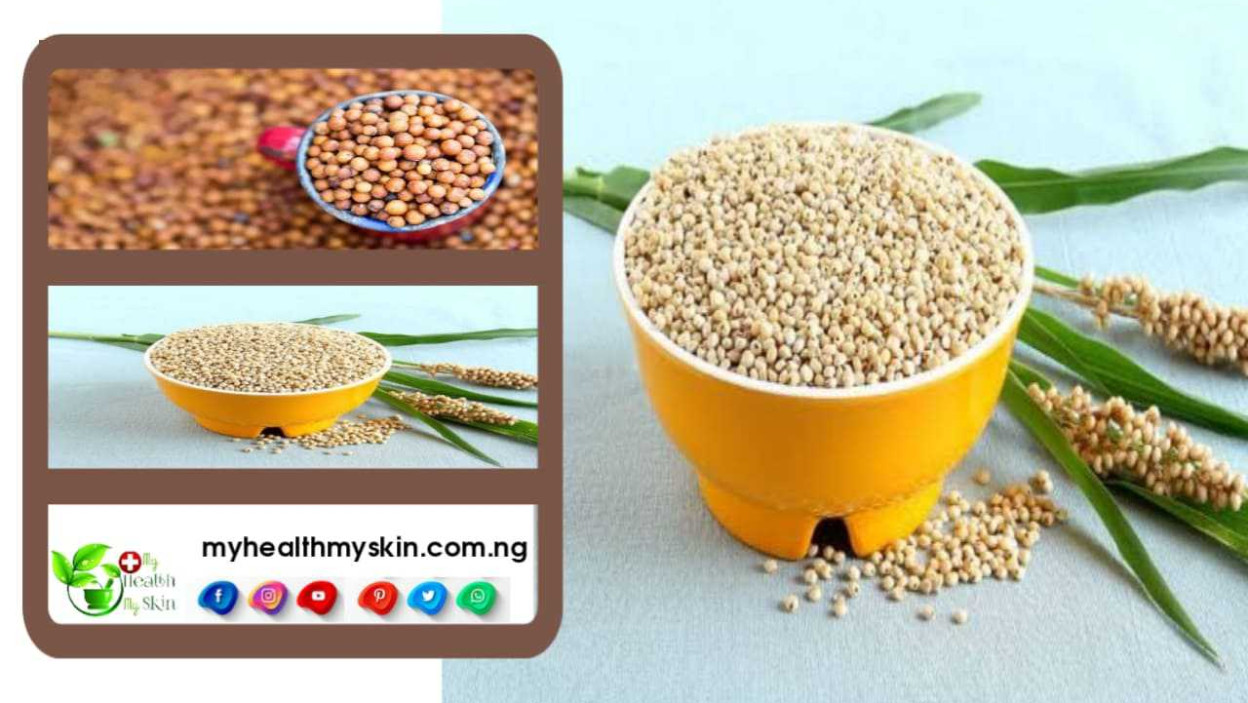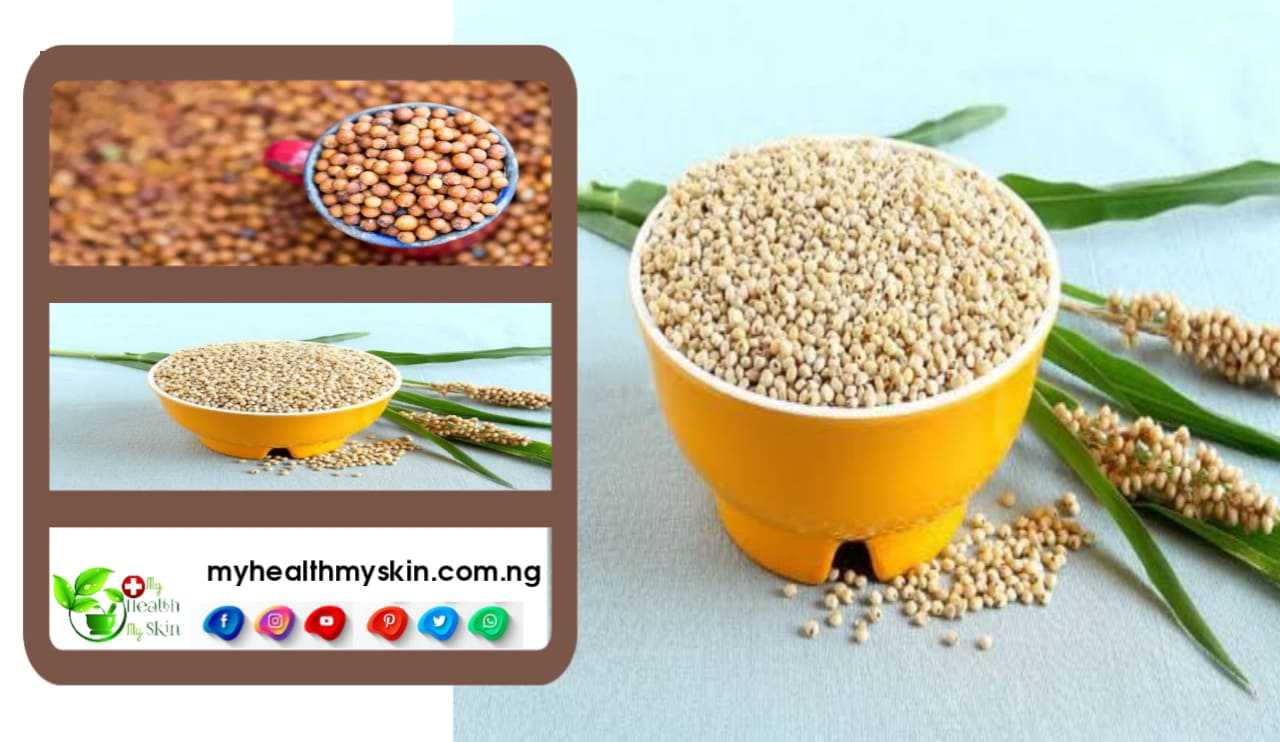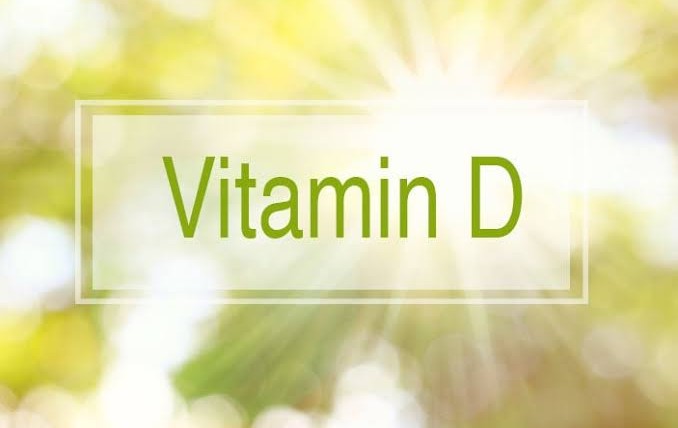Guinea corn, also known as sorghum bicolor is one of the agricultural products from food plants which is included as a staple food. Although it is less popular than other grains (rice, wheat, maize), Guinea corn actually has health benefits, and can even be used as a substitute for rice.
Guinea corn is a type of food that is grown in more than a dozen states in the U.S. But it is more popular in Texas, Kansas, Oklahoma, Colorado, South Dakota and Nebraska. This food plant has a taste great and can be obtained at affordable prices. However, what do you know about the benefits of Guinea corn (sorghum) for health. The health benefits of Guinea corn (sorghum) that are rarely known are reducing inflammation, preventing cancer, and being safe for people with celiac disease to eat.
Sorghum bicolor is the fifth most commonly cultivated food plant in the world. The order is after wheat, rice, maize, and barley.
In countries in Africa and Asia, this food plant is widely used for drinks, cereal or beverages. In countries on these continents, cereal supplies up to 70% of daily caloric intake. According to the Food and Agriculture Organization of the United Nations (FAO), the consumption of Guinea corn by the African population reaches almost 75% of the total grain produced in the country.
Unfortunately, this healthy food is often neglected in many western countries. In fact, this gluten-free grain has many health benefits that makes it worthy of being included in a healthy diet, even as a substitute for rice.
This food plant can be processed in various ways, from boiling, steaming, to cooking it into soup. There are people who choose Guinea corn as a staple food for their diet because it is high in fiber and contains additional nutrients that are not found in ordinary carbohydrate sources.
[lwptoc]
Read: Is Corn Bad For Gout Sufferers? Read Astonishing Facts
Compound Content in Guinea corn
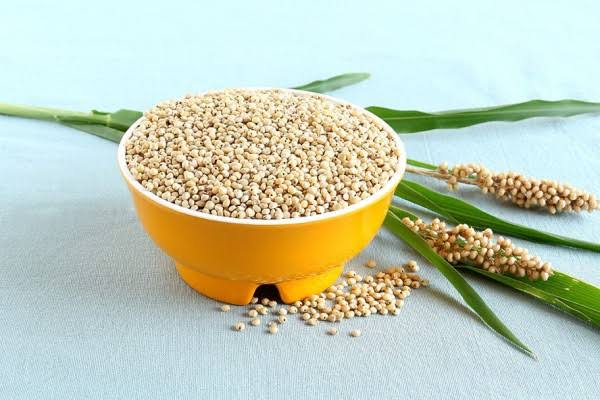
Guinea corn or Sorghum is generally an ingredient for the production of food sources, but this plant also has potential as an herbal medicine, because it contains various important compounds that the body needs. This is because these plants contain three types of carbohydrates, namely starch, dissolved sugar, and fiber, and the most important thing is that they do not contain gluten or are gluten-free.
The absence of these ingredients makes sorghum safe for daily consumption because gluten is a compound that makes weight gain. Not only gluten-free, some such as phenolic compounds are also known to have anti-oxidant activity, anti-tumor and can inhibit the development of viruses so that they are beneficial for people with cancer, heart disease and HIV -1
Nutritional content in Guinea corn
The main content of Guinea corn consists of carbohydrates, protein, fat, fiber, and micronutrients.
Its constituent micronutrient components including antioxidants, vitamins and minerals making sorghum rich in nutrients.
Based on the nutritional facts contained in the Indonesian Food Composition Data page, sorghum weighing 100 grams (g) has the following nutritional composition:
- Energy: 366 Calories (Cal)
- Protein: 11 g
- Carbs: 73 g
- Fat: 3.3 g
- Fiber: 1.2 g
- Vitamin B1 (thiamine): 0.09 milligram (mg)
- Vitamin B2 (riboflavin): 0.14 mg
- Niacin: 2.8 mg
- Iron: 4.4 mg
- Fosfor: 287 mg
- Potassium: 249 mg
Most of the health benefits of Guinea corn come from its vitamins, minerals, and antioxidants such as flavonoids, phenolic acids, and tannins.
Although it is a substitute for rice, Guinea corn has a protein content that is high enough to meet daily protein needs.
In fact, the nutritional content of Guinea corn is equivalent to wheat and other grains rich in fiber.
Interestingly, unlike most grains, Guinea corn does not contain gluten. Well, this is certainly good news for people who have allergies to gluten. So, of all the nutrients contained, what are the benefits of Guinea corn for health?
Health Benefits Of Guinea Corn (Sorghum)
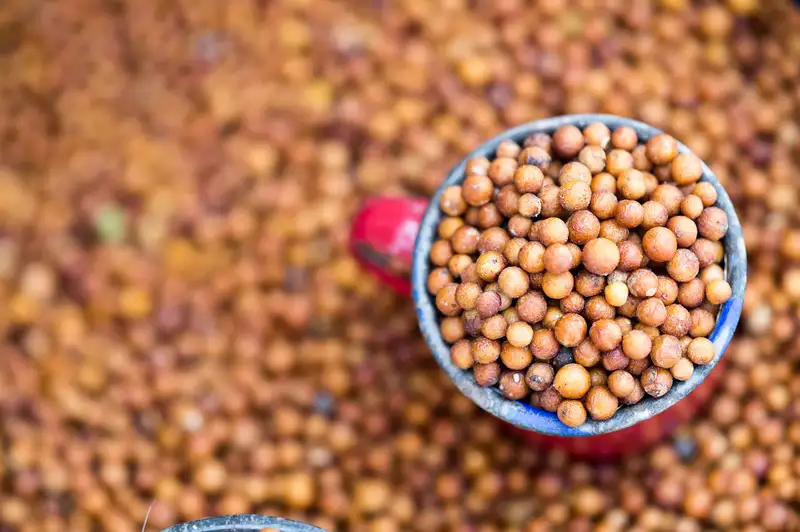
Seeing the various nutritional content, Guinea corn can provide a myriad of health benefits, including overcoming and preventing certain diseases. Here are some of the benefits of Guinea corn that you need to know:
Increase body energy
The benefits of Guinea corn in increasing energy have been proven in the journal Nutrient Research. Sorghum contains niacin or vitamin B3 which can help the body break down nutrients from food into energy that we use for daily activities.
Prevents cancer
Several phenolic compounds in Guinea corn have anticancer effects. The tannins in sorghum (which contribute to the grain’s pigmentation), can inhibit enzymes related to the development of breast cancer.
Meanwhile, another group of phenolic compounds in Guinea corn, known as 3 deoxyanthocyanidins, have been shown to have deleterious effects on some human cancer cells.
Control blood pressure
Replacing pasta and rice with whole grains such as Guinea corn can also increase potassium intake and reduce sodium intake in the body, so that it can keep blood pressure stable.
Therefore, sorghum is very suitable for daily consumption, especially for those of you who suffer from hypertension or are at high risk of developing hypertension.
Reduce inflammation
Guinea corn is known to contain many phenolic compounds, some of which act as antioxidants. This food plant has been proven to be good at reducing some forms of inflammation or swelling, due to its antioxidant properties.
Helps the process of weight loss

The starch in Guinea corn is difficult for the human body to digest, compared to other grains. Therefore, Guinea corn can make the stomach feel full longer, without the need to take in a lot of calories.
A 2019 study in the Journal of Nutrition shows that a high-fiber diet can help overweight people achieve their ideal body weight.
This is because eating sorghum can provide a longer feeling of fullness. That way, you don’t need to add more calorie intake from other foods.
However, those who are trying to lose weight, Guinea corn can be the right choice.
Improve digestive health
Guinea corn is one of the best sources of dietary fiber. One serving of sorghum contains 48 percent of the recommended daily fiber intake. As is known, fiber is very important for the functioning of the digestive system. Fiber can launch the digestive system, so it can prevent constipation. If the digestive system works optimally, then other health problems can be prevented.
Safe for people with celiac disease
Guinea corn and its derivative products, including sorghum flour, have been designated as safe alternative grains for people with celiac disease. The Journal of Agricultural and Food Chemistry published a study analyzing the sorghum genome to determine whether it contains the gluten protein. They confirmed that gluten is not available in all varieties of Guinea corn.
Maintain blood sugar levels
Any food that contains carbohydrates can affect blood sugar (glucose) levels in the body.
In fact, certain types of carbohydrates can easily increase glucose levels.
However, sorghum is a whole grain composed of substances with a complex structure such as starch, fiber, phenolic acids and antioxidants.
This makes it difficult to decompose when digested so it is not quickly released into glucose.
This means that sorghum is safe for consumption by diabetics because it is useful in controlling blood sugar levels so that they remain normal.
Maintain cholesterol levels
Sorghum contains a lipid substance, namely policosanol, which can inhibit excess cholesterol synthesis in the body.
This substance can significantly reduce levels of cholesterol (non-HDL plasma) in the blood. Therefore, sorghum is efficacious in keeping cholesterol from rising quickly.
However, so far research on the benefits of Guinea corn is still being carried out on animals.
To know the benefits for sure, scientists still need testing on humans on a larger scale.
Maintain heart health
Make no mistake, fiber also plays an important role in maintaining heart health. When the daily need for fiber is met, bad cholesterol (LDL) can be cleared.
Thus, heart health can be maintained. Diseases such as strokes, heart attacks, and atherosclerosis can also be prevented.
Improve bone health
Sorghum contains high levels of magnesium. This mineral can help the body absorb calcium better so that calcium levels in the body are maintained.
The combination of magnesium and calcium will improve bone health. Not only that, diseases such as osteoporosis can also be prevented.
Improve blood circulation
According to a study from the Science of The Total Environment, sorghum contains minerals that can improve blood circulation.
For example, the presence of the mineral copper in sorghum can help the body absorb iron better. This can help you prevent diseases such as anemia.
When iron levels are met, red blood cell production is maintained so that blood circulation will run smoothly.
Side effects of Guinea corn
Besides Guinea corn being called a “superfood” food because it has so many potential health benefits, that does not mean that it cannot cause side effects on the body. Sorghum can cause side effects on the body if consumed in excess and the wrong way to process it.
Here are some side effects that can be caused by Guinea corn on health:
Poisoning
Sorghum seeds can actually cause effects such as poisoning if consumed with the wrong processing method. This is because these plants have a fairly high content of saponin compounds which can cause poisoning if consumed in large quantities.
Therefore, when processing sorghum seeds, several tips are needed so that the content of saponin compounds in sorghum can be reduced and it cannot cause poisoning in someone.
Allergy
Not only that, but sorghum can also cause allergies for people who consume it for the first time. This is also because there are saponin compounds that cause this allergy.
Saponin compounds that enter the body can be considered a threat by the body’s immune system and make it fight these compounds, causing allergic symptoms, such as hives, nausea or dizziness.
If you experience these symptoms after consuming it, it would be better if you consult your doctor or the nearest medical expert.
How to use Guinea corn
This food plant is a versatile ingredient and easy to add to your diet. Here are some ways to enjoy Guinea corn:
- As a substitute for rice. You can cook whole wheat and pearl sorghum like cooking rice in general.
- As flour. Thanks to its neutral taste and light color, sorghum flour serves as a gluten-free flour in most recipes.
- Popcorn. Put some Guinea corn in a heated pot, they will pop like popcorn. You just add spices to add flavor.
- Cereals. As with other cereal grains (such as oats), flaked sorghum is delicious as a cereal and in baked goods, such as granola.
- Syrup. Sorghum syrup is usually added to processed foods as a natural sweetener.
How long to cook Guinea corn?
For use in the kitchen, soak the seeds for at least 4 hours or preferably overnight and then boil for 20 minutes with double the volume of water and let it soak for 10 minutes. The seeds have the appearance and neutral soft taste of rice and can be used in all sweet and savory rice dishes.
You may also be interested in:
10 Benefits Of Cloves Sexually For Men And Women
Samsu Oil: Health Benefits And Samsu Oil Side Effects
8 Benefits Of Garlic That You Should Take Advantage Of
Garden Eggs: 8 Health Benefits and Side Effects
FAQS
How healthy is Guinea corn?
Sorghum is rich in vitamins, minerals, protein and fiber and also gluten-free. This cereal grain may help reduce the risk of certain cancers, as well as aid in diabetes control and prevention.
What is made from Guinea corn?
In South America, the United States and Australia, this cereal is basically used in animal feed. In Central America, Asia and Africa, its grains are also used in human food for the production of flour and industrial starch, in the manufacture of bread and biscuits.
Who eats Guinea corn?
Widely used in feeding poultry, pigs and ruminants, either as an ingredient in feeds and supplements or as roughage (sorghum silage, in the case of ruminants), this input, provided it is well processed, can bring economic advantages to the producer.
Which is better Guinea corn or maize?
The benefits of Guinea corn over maize is that the plant is more tolerant of dry periods. So, in regions where rainfall is less abundant, it is safer to plant Guinea corn instead of maize for silage. The maize and Guinea corn ensilage process is similar to that of other silages.
What is the difference between wheat and Guinea corn?
Guinea corn flour has more than five times more fiber than wheat flour. While 30 grams of wheat flour has only 0.6 grams of fiber, sorghum flour has 3.3 grams of fiber in the same amount.
What vitamins does Guinea corn have?
It is a cereal rich in iron, zinc, protein, fiber and vitamin E. It is still a source of fibers, anthocyanins, phenolic acids, tannins and resistant starch. It also contains phenolic compounds with high antioxidant capacity, important for fighting chronic diseases.
How is the Guinea corn plant?
It is a type of low-sized sorghum, plant height up to 170 cm, which produces a compact panicle (bunch) of grains at the upper end. In this type of sorghum, the main product is the grain. However, after harvesting, as the rest of the plant is still green, it can also be used as hay or grazing.
Is Sorghum Flour Low in Carbs?
Nutritional value: per 100 g – Energy: 1,475 kJ / 348 kcal – Fats: 2.9 g – of which saturated: 0.2 g – Carbohydrates: 72.2 g – of which sugars: 0.2 g – Dietary fibre: 2.2 g – Proteins: 9.4 g – Salt: 0.0 g. No reviews found.
Conclusion
Guinea corn is made up of chemical compounds that can generate various benefits to people’s health, being considered the fifth most important cereal in the world.
Although sorghum grain is rich in nutrients, sorghum is a type of grass that can cause allergic reactions in some people due to the content of grass pollen in it.
Symptoms of a food allergy from sorghum include tingling or itching in the mouth, swelling in and around the mouth, stomach pain, nausea, vomiting and even fainting.
A severe allergic reaction or anaphylaxis can cause any food allergy and can be life-threatening.
Even though this rarely happens, you should still be aware of it.
Also, eat sorghum in moderation and don’t overdo it. Excessive consumption of food, even if it is healthy food, has the potential to cause harm to health.
We hope this article helped you learn about guinea corn: health benefits and side effects (sorghum). You may also want to learn about Longevity Spinach: 13 Potential Health Benefits, Uses And How To Grow, or check out our Diet & Nutrition category.
If you liked this article, then please share on your social networks and stay tuned for upcoming articles. You can also find us on Telegram and Facebook.

